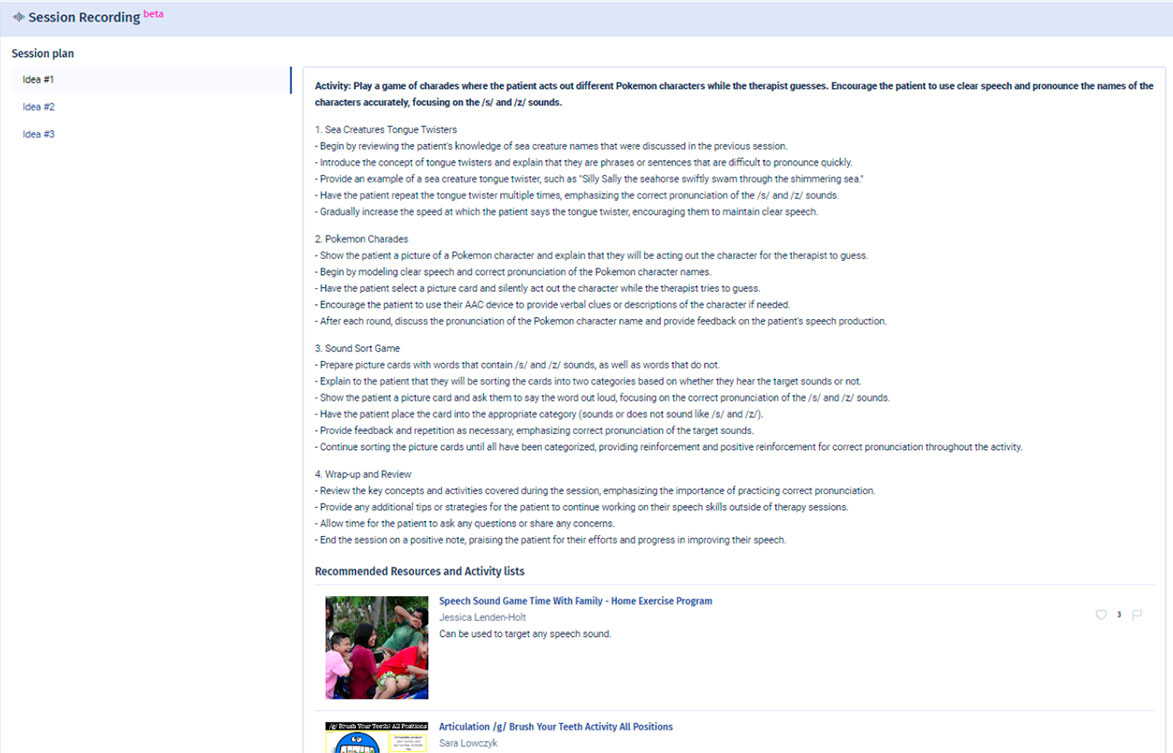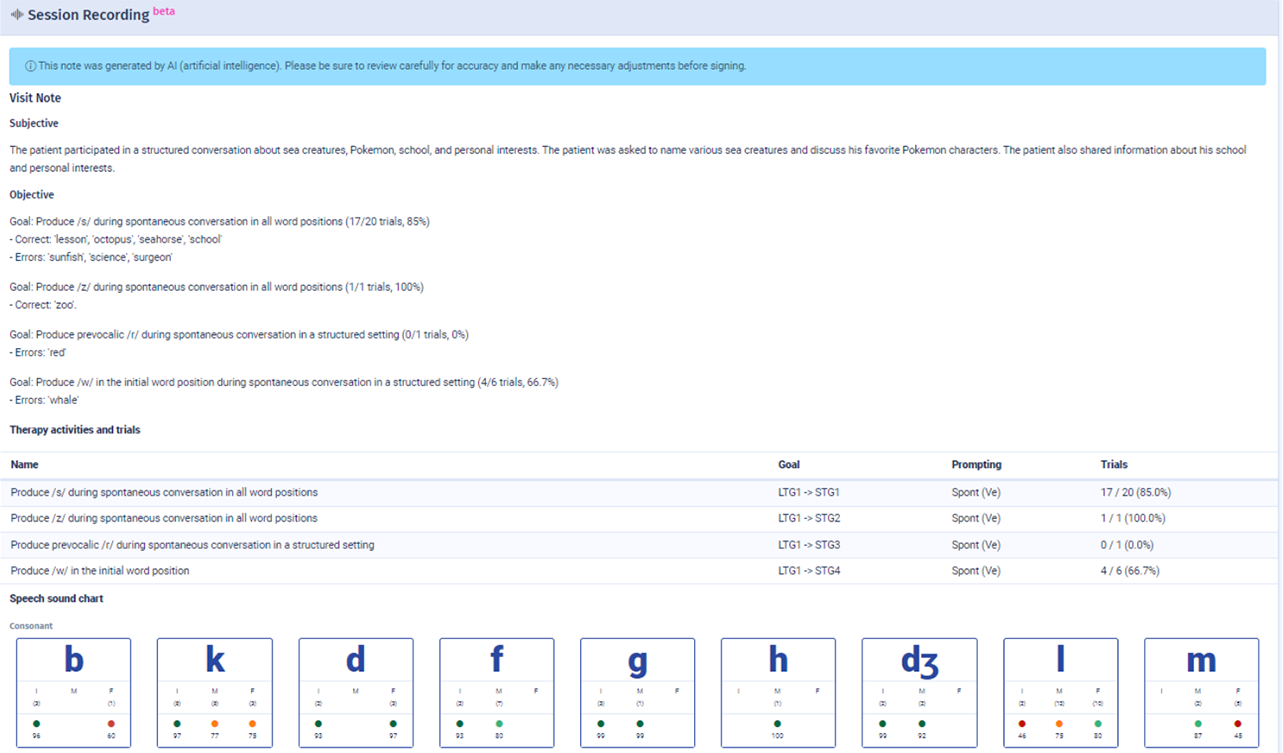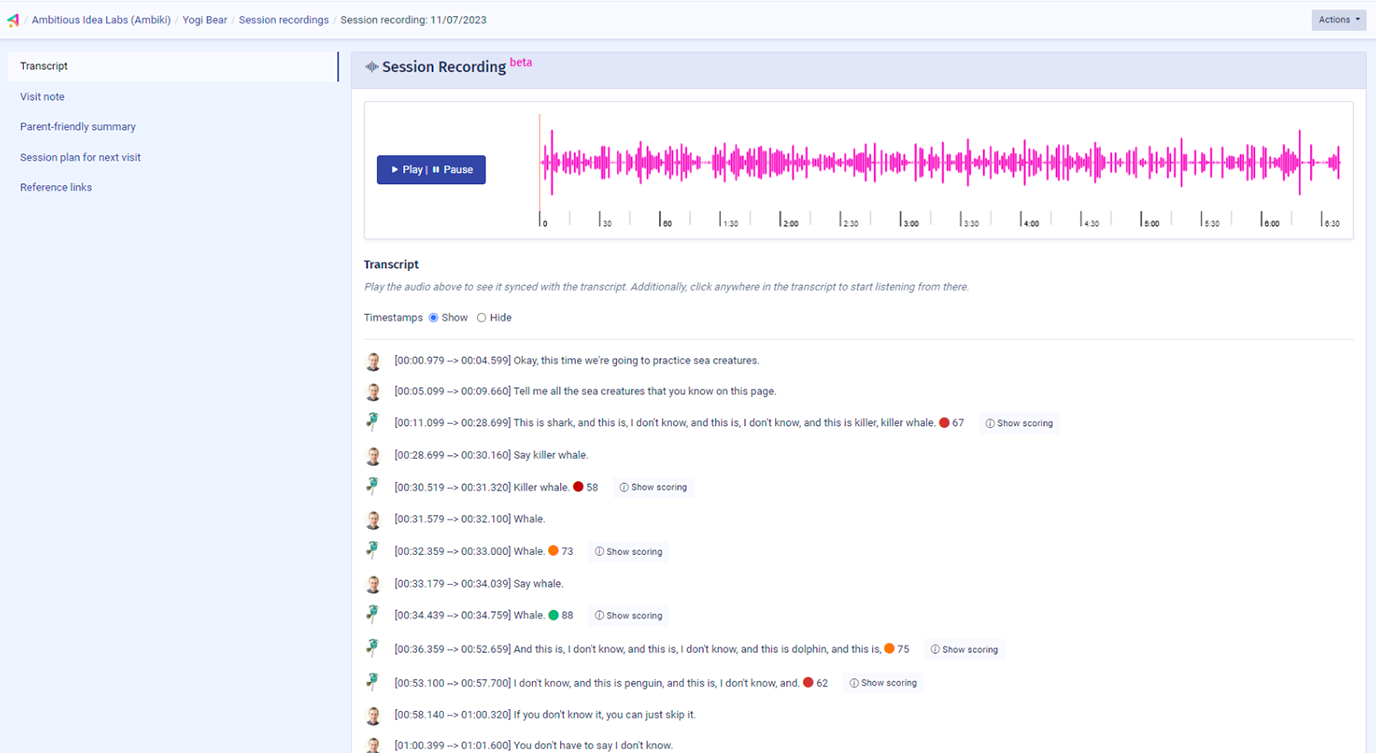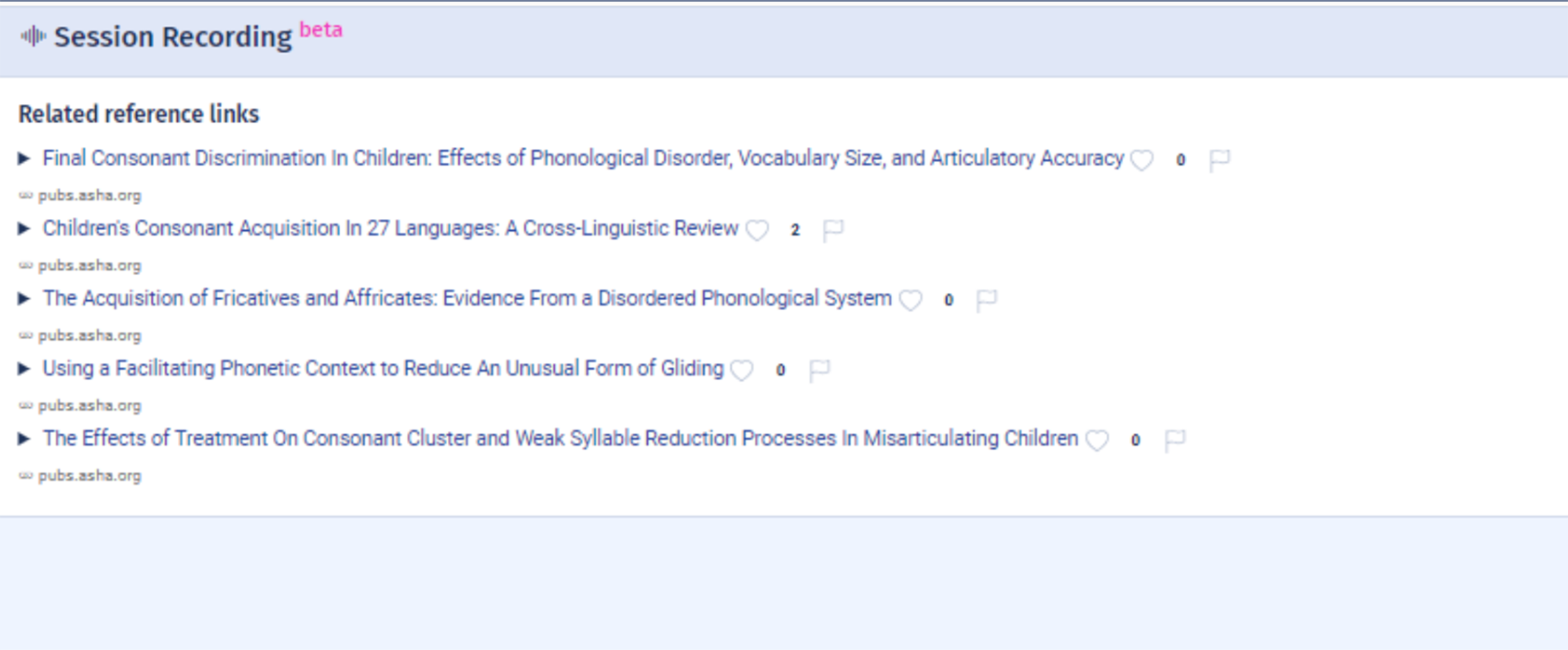The Ambiki EMR difference
Transform patient care through innovative AI-powered documentation (Patent Pending)
This state-of-the-art patent pending documentation system saves hours of administrative work, freeing up therapists to focus on delivering exceptional patient care. By capturing nuances in session dialogue without tedious manual note taking, Tenalog® empowers practices to work smarter, avoid clinician burnout and achieve better outcomes. Powered by cutting-edge AI, Tenalog® revolutionizes clinical documentation by automatically generating:
- A detailed transcript of the session.
- An in-depth SOAP note.
- Automated progress tracking.
- Analysis of articulation errors down to the phoneme level.
- A parent-friendly summary of progress.
CLICK TO ENLARGE
FAQ
Are parents/legal guardians/patients required to give consent prior to using Tenalog®?
The legal answer to this question may depend on the local laws in your country, region, or state and may depend on the rules of your licensing board. Regardless, we highly recommend ensuring that you have the written consent of your patient before uploading or recording a session on Ambiki. Ambiki provides a sample consent form for Tenalog® and offers the same form electronically through our patient intake forms feature.
How many speakers can Tenalog® recognize in one session?
Currently Tenalog is designed to support one to one sessions (one therapist and one patient). In future versions of Tenalog® we plan to add support for group sessions.
Is Tenalog® HIPAA compliant?
Yes, Tenalog®, like all features on Ambiki, strictly complies with HIPAA regulations. Our dedicated team is committed to maintaining high standards of privacy and security, consistently prioritizing caution in all matters related to HIPAA compliance. This principle is illustrated by our stance on issues such as third-party cookies, the use of remote control in Teletherapy, among others.
How accurate is Tenalog®?
The short answer - diving a definitive answer regarding Tenalog®'s accuracy isn't possible currently. We need more data to provide an empirical answer with confidence. We strongly believe that Tenalog® will enhance the quality of visit notes, improve progress tracking, and save therapists significant time in the long run.
The longer answer - determining accuracy isn't simple. It's more than just identifying mistakes in a note - we're assessing the quality and understandability of a complex narrative that's much richer than a typical visit note. For instance, our tool can generate a depth of data akin to a 'short story' from a 20-minute session, which is significantly more than a standard visit note.
Therefore, in considering error rates, it's essential to factor in the depth and size of the note, whether it be the length, character count, or associated progress tracking data (we can't just compare the raw number of errors).
Moreover, to gauge accuracy, we need a reliable benchmark. We'd have to know the baseline accuracy of a manually written visit note, but, as far as we're aware, no such studies exist.
We should also aim to comprehend the concept of error tolerance. For instance, imagine a scenario where we ask 100 SLPs to evaluate a sound sample of the word 'shark'. Let's say the average score they provide is 75 out of 100. However, if Tenalog®, trained with millions of samples, gives a rating of 70, would we classify this as an error? How about a score of 68? 60? We need to define our acceptable margin of error in such cases.
A comprehensive study to answer these questions would be costly and challenging. It would involve numerous therapists analyzing thousands of hours of therapy sessions, and patient consent would be required.
Thus, in a pragmatic sense, we believe that the true measure of Tenalog®'s accuracy will be determined by its real-world utility. If therapists find Tenalog® valuable enough to use it, despite occasional corrections, then we'll know we've achieved an acceptable level of accuracy. Our commitment is to continuously refine Tenalog® to make it as effective and accurate as possible. Your insights and feedback will play a crucial role in this continuous improvement journey.
Does Tenalog® account for different accents and languages?
For transcription, Tenalog® currently only supports English. Pronunciation scoring in Tenalog® is based on the General American English dialect (that you may hear on a national TV news program).
Some general tendencies include:
{un-numbered bullet list}
- Rhoticity: American English is rhotic, meaning the /r/ sound is pronounced at the end of words and syllables, as in 'car' and 'hard'.
- Flapping: The /t/ and /d/ sounds are often pronounced as a flap [ɾ] between vowels, such as in 'butter' [ˈbʌɾər] or 'ladder' [ˈlæɾər].
- The cot-caught merger: In many (but not all) varieties of American English, the vowels in 'cot' and 'caught' are pronounced the same.
- Pronunciation of /æ/: In many words, the /æ/ sound (as in 'cat') is pronounced with a nasal, more open sound before nasal consonants, leading to the pronunciation [æ̃], as in 'man' or 'hand'.
On what scale does Tenalog® score pronunciation?
Tenalog® uses the scale below. You can adjust the score threshold for a 'correct trial' on a patient by patient basis in Ambiki. Tenalog® is able to produce both a word or phrase level score as well as a score for each individual phoneme.
- 90 - 100: Excellent.
- 80 - 89: Very Good and clearly intelligible.
- 70 - 79: Good. Intelligible but with one or two evident mistakes.
- 60 - 69: Fair. Possibly not intelligible with several evident mistakes.
- 0 - 59: Poor and should be reattempted.
Could Tenalog® potentially jeopardize job security in the industry?
We are developing Tenalog® to be a tool that complements the skills and knowledge of SLPs, OTs and PTs, not to replace them. Our entire business model and purpose are fundamentally linked to the prosperity of the therapists we develop these tools for. Without therapists, Ambiki wouldn't have a foundation to stand on.
One of the goals of Ambiki is to amplify the value add of SLPs, OTs, and PTs. To help you practice at the top of your license. To help you focus your time on the work flows where your expertise is desperately needed, while helping to automate the more mundane tasks.
Learn more about our mission and values here.
Will Tenalog® create more administrative work for therapists given that they will want to carefully review all of the generated output?
Initially, there may be a slight increase in time spent as therapists familiarize themselves with Tenalog® and build trust in its capabilities. We recommend therapists to thoroughly examine the outputs from their initial sessions. However, our observations suggest that over time, therapists have been able to significantly cut down the time devoted to creating visit notes, thanks to Tenalog®.
We generally conduct our therapy sessions in a school which unfortunately has poor Wi-Fi. Will Tenalog® work in that case?
Yes, Tenalog® allows both the upload of an audio file, or the ability to record directly online with Ambiki's built-in recorder. Thus, if you are in an area with poor Wi-Fi you could record the session on your local device and upload it to Ambiki later when you are back in an area with a Wi-Fi connection.
Is a noise-filtering microphone necessary for Tenalog®? What happens if there is background noise during my session?
No, you do not need to use any special microphone for Tenalog®. The microphone on your smart phone or device will work fine. Tenalog® is generally very good about filtering out background noise; however, we suggest conducting your session in a tranquil setting, as far as feasible, to ensure the recording captures both you and your patient distinctly.
How easy is it to edit the output of Tenalog®?
You can easily edit the transcription, correct the speaker labels, and also easily correct the timestamps of the scored segments using the powerful Tenalog® Editor.
How does Tenalog® calculate a 'correct' trial vs. an 'incorrect' trial for purposes of progress tracking?
The default for a correct trial is a score of 70 or greater which equates to 'Good / Intelligible'. However, this threshold can be configured on a patient by patient basis. For example, if you have an early intervention patient you may want to lower this threshold such that it is easier to achieve a correct trial.
For goals that are not related to articulation, Tenalog® will automatically extract the therapy activity but will leave the 'correct trials' and 'total trials' up to the therapist to input.
Who is responsible for transcribing the audio recordings?
The process of transcribing the audio recordings is fully automated, with no human intervention. The transcription is performed by our HIPAA-compliant servers at Ambiki, backed by robust data security measures and privacy protection controls.
Is it mandatory to have a pre-established Plan of Care (POC) and patient goals in the system before trying out Tenalog®?
No, it's not mandatory to have a POC set up prior to utilizing Tenalog®. However, having patient goals in Ambiki significantly amplifies the potential of Tenalog®. By integrating targeted goals with the context of session transcripts, Tenalog® can generate even more refined progress tracking data.
What is the processing duration for an audio file using Tenalog®?
Once your audio file reaches the front of the processing queue, it typically takes around 1.5 times the length of the file to process. For instance, if you have a 20-minute audio session, it will take approximately 30 minutes to process.
Can occupational therapists (OTs) and physical therapists (PTs) use Tenalog®?
Yes. With slight tweaks in how they narrate their session, OTs and PTs have found Tenalog® to be a very powerful tool. As an example, OTs and PTs found it useful to explicitly narrate what is happening in the session ('Patient is now drawing a circle. Great job! That one looks really good.'; 'We are going to do 5 leg lifts starting with your right leg.').
How accurately does Tenalog® analyze data pertaining to the client's specific goals?
One of the most impressive aspects of Tenalog® is its precision in data analysis relative to a client's unique goals. Once the client's goals are added into Ambiki, Tenalog® will draft the visit note and distill progress tracking data within the context of the patient's goals. The system can discern which goals you are addressing in each particular session, recognizing that not all goals may be the focus of every session.
Is Tenalog® only for articulation goals? If not, how accurate is it to identify expressive vocabulary goals, such as sentence expansion, or receptive goals such as answering 'wh' questions?
Tenalog® can write the SOAP visit note and extract therapy activities based on any type of goal, including OT and PT goals. The major difference is that with articulation goals Tenalog® will be able to ascertain the correct and incorrect trials on its own. For other goals, Tenalog® will extract the therapy activity (i.e. 'Cut across an 8-inch piece of paper'), but the therapist will need to fill in the number of correct and total trials.
Do you provide an API?
Indeed, we do have a (currently unpublished) API for Tenalog®. We're confident that Tenalog® surpasses our competitors when it comes to speech-to-text and speaker diarization accuracy, a conclusion drawn from extensive testing. Our focus remains on our niche, without venturing into other sectors such as English as a Second Language or Education. If you're interested in integrating our API into your product, feel free to contact us at info at ambiki.com. We offer dedicated server setups and ensure HIPAA compliance.
Do I need to use Ambiki's EMR in order to use Tenalog®?
No, Tenalog® makes it easy to export the visit note as a plain text file. However, there are significant progress tracking benefits to using Tenalog® alongside Ambiki's EMR.
What happens if there is an error processing my audio file with Tenalog®? Will I still be charged?
No, you will only be charged for successfully processed Tenalog® sessions. In the event there is an issue processing your file, the team will look into the issue. It may be able to be re-processed successfully. In the event it is not, you will not be charged.
Are there any discounts offered for buying Tenalog® credits in bulk?
Yes, if you plan to purchase more than 10,000 Tenalog® credits please contact us.
Can I trial Tenalog® for free?
Yes, upon sign up you will receive 5 Tenalog® trial credits. Trial credits analyze the first 2 minutes of an audio file.
How long can my audio file be?
Tenalog® will analyze the first 30 minutes of an audio file (unless you are on the free trial in which case the first 2 minutes will be analyzed).
Can I upload a video file?
Yes, video files are also supported.
What file types does Tenalog® support?
.ogg, .mp3, .m4a, .wav, .mp4, .avi, .mov, .m4v
Tenalog® - A Day in the Life
A quick promotional video showing how Tenalog® can help you get your time back.
Ambiki
Because therapists
deserve good tech




